Difference between revisions of "City of Stone Part Four"
(→Summary) |
|||
| Line 8: | Line 8: | ||
==Tidbits== | ==Tidbits== | ||
| − | The link between [[Demona]] and [[Macbeth]] ties in with [[Shakespeare]]'s play in a subtle fashion. In Shakespeare's [[Macbeth (play)|Macbeth]], the Three Witches tell him that "none of woman born" can kill him, which Macbeth misinterprets as meaning that he is invulnerable - until he discovers that his sworn foe, [[Macduff]], was "from his mother's womb untimely ripped", i.e., born through Caesarian section. Demona, the only person who can kill the Macbeth of ''Gargoyles'', was hatched from a [[gargoyle]] egg, which surely counts as being as much of a loophole as Macduff's birth. (According to [[Greg Weisman]], there were plans at one point to mention this in ''City of Stone'', but these were dropped for lack of time. So also were plans to adapt the Birnam Wood sequence from Shakespeare's play into the story.) | + | The link between [[Demona]] and [[Macbeth]] ties in with [[Shakespeare]]'s play in a subtle fashion. In Shakespeare's [[Macbeth (play)|Macbeth]], the Three Witches tell him that "none of woman born" can kill him, which Macbeth misinterprets as meaning that he is invulnerable - until he discovers that his sworn foe, [[Macduff]], was "from his mother's womb untimely ripped", i.e., born through Caesarian section. Demona, the only person who can kill the Macbeth of ''Gargoyles'', was hatched from a [[gargoyle]] [[eggs|egg]], which surely counts as being as much of a loophole as Macduff's birth. (According to [[Greg Weisman]], there were plans at one point to mention this in ''City of Stone'', but these were dropped for lack of time. So also were plans to adapt the Birnam Wood sequence from Shakespeare's play into the story.) |
[[Bodhe]] mentions that the English had already wiped out all the gargoyles in England; we will find out in ''[[M.I.A.]]'' that he was mistaken. This is the first time in the series that it is acknowledged that there were gargoyles native to regions other than [[Scotland]]. | [[Bodhe]] mentions that the English had already wiped out all the gargoyles in England; we will find out in ''[[M.I.A.]]'' that he was mistaken. This is the first time in the series that it is acknowledged that there were gargoyles native to regions other than [[Scotland]]. | ||
Revision as of 10:46, 9 April 2007
Story Editor: Michael Reaves
Story: Michael Reaves
Teleplay: Brynne Chandler Reaves & Lydia Marano
Summary
Tidbits
The link between Demona and Macbeth ties in with Shakespeare's play in a subtle fashion. In Shakespeare's Macbeth, the Three Witches tell him that "none of woman born" can kill him, which Macbeth misinterprets as meaning that he is invulnerable - until he discovers that his sworn foe, Macduff, was "from his mother's womb untimely ripped", i.e., born through Caesarian section. Demona, the only person who can kill the Macbeth of Gargoyles, was hatched from a gargoyle egg, which surely counts as being as much of a loophole as Macduff's birth. (According to Greg Weisman, there were plans at one point to mention this in City of Stone, but these were dropped for lack of time. So also were plans to adapt the Birnam Wood sequence from Shakespeare's play into the story.)
Bodhe mentions that the English had already wiped out all the gargoyles in England; we will find out in M.I.A. that he was mistaken. This is the first time in the series that it is acknowledged that there were gargoyles native to regions other than Scotland.
In actual history, Canmore overthrew Luach in 1058 (the year after Macbeth's final defeat) and became King of Scotland (an event hinted at in the Weird Sisters' words to Macbeth near the end of this episode - "Did your own death save Luach from Canmore?"). He ruled until 1093, when he was slain in battle against the English (who had by this time been conquered by the Normans, so that he was not actually at war with his former allies, but with their subjugators) - at least, officially, his slayers were the English. From the perspective of the Gargoyles Universe, on the other hand, one wonders whether Canmore's death may have come from the hands of another party, something that would explain certain developments much later on in the series....
Links
| << Previous Episode: "City of Stone" Part Three | Next Episode: "High Noon" >> |
